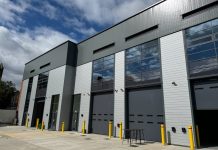
The industrial property sector has been largely unaffected by the Brexit vote with 7m sq ft of logistics space being taken up in the third quarter – in line with the five-year average – and robust occupier and investor demand across most regions, according to Cushman & Wakefield.
E-commerce is a significant driver of this activity with strong demand for logistics space in urban fringes as occupiers seek last mile fulfilment. Retailers, supermarkets and third-party logistics providers are all very active in this market and particularly keen on modern, big box space.
But demand is also robust for mid-size and cross-dock facilities in both prime and second-tier locations as occupiers seek to optimise their distribution networks across the UK.
Development has increased to meet this demand with Grade A available space up 17% in 2016 to date following several years of declining supply. This is in part due to more speculative development, particularly in the South East, Midlands and North West, where demand is strongest.
In the South West, Q3 take-up volumes were boosted by retailer, The Range’s purchase of 55 acre site at Delta Properties’ logistics development at Central Park, Bristol. Construction has now commenced on one of the largest distribution centres ever seen in the South West, and one of the largest in the UK. As a result, take-up volumes in the region have jumped to 2.3 million sq ft in Q3, and following a strong H1, could lead to a record year. As a result of high take-up, there has been an 18% fall in availability across the South West this year, however, the region has one of the strongest development pipelines in the UK with close to 3.4 million sq ft across five schemes, proposed to complete over the next three years.
Philip Cranstone, Associate in the Industrial & Logistics at Cushman & Wakefield in Bristol, commented: “2016 has been a bumper year for the South West, with big box logistics operators and discount retailers finally turning their attentions to the region. The Range deal has clearly had a huge impact, but it was not the sole contributor with several deals in Bristol, Gloucester, Ross-on-Wye, and more recently Swindon where four large transactions concluded over the summer, shrinking existing building supply in the town considerably.
He continued: “The latter part of 2016 and early 2017 is also expected to be strong, in part due to the proposed commencement in development of Lidl distribution centres in Bristol and Exeter, and facilities for DPD Geopostand Davies Turner amongst other occupiers. The proposed speculative schemes in Bristol will begin to come out of the ground later in 2017, and it is hoped that other developers will make commitments to speculatively develop in other areas, in particular along the M4 corridor between Bristol and Swindon.”
Investors have also been seeking opportunities outside the established M1 and M6 corridors with interest particularly strong along other primary routes – notably the M4, M5, M62 and main trunk routes across the Midlands. Despite the rise in availability, most regions are struggling to keep up with demand and as a result, Cushman & Wakefield expects further upward pressure on rents moving into 2017.
Whilst investment demand for logistics space is strong, with overseas buyers competing hard with their UK counterparts for limited opportunities in prime locations, some regions may face upward pressure on yields going forward as investors demand higher premiums to compensate for greater economic uncertainty caused, in part, by the Brexit vote.
Simon Lloyd, Partner, Industrial & Logistics at Cushman & Wakefield, said: “The UK is at the forefront of the growth in e-commerce which is accounting for an ever-increasing amount of sales – a trend which is forecast to continue.
“This has led to many companies re-organising their operations and setting up separate warehouses – often in multiple regional locations – specifically to deal with internet sales. Together with the rapid growth of a number of online-only retailers such as Amazon and Wiggle, this has ensured the robust market we are now seeing.
“Also, the renaissance in UK manufacturing over the last 5-10 years has accounted for an increasing share of the industrial/warehouse market, although it is still a smaller market than for warehousing. In some regions, this growth has been led by the automotive sector. But there has also been growth in many other sectors such as pharmaceuticals, engineering and food, resulting is many more skilled jobs.”



















